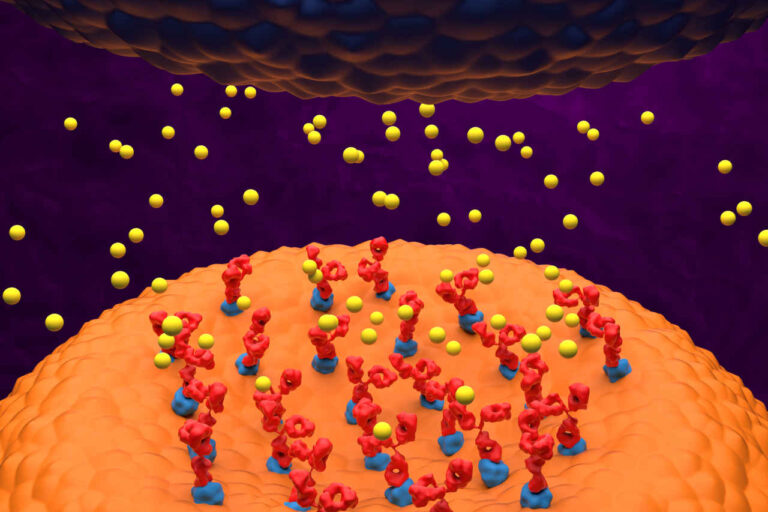
Myasthenia gravis (MG) is an autoimmune disease in which your antibodies block or break down the communication between nerves and muscles, resulting in poor muscle function or weakness.
Symptoms of MG may include weakness in the arm and leg muscles, double vision, and difficulties with speech and eating. Various treatments are available for this condition. However, people with myasthenia gravis must avoid certain medications to prevent complications.
Here, we will take a closer look at these drugs.
Get IVIG Copay Assistance
Speak to a SpecialistMyasthenia Gravis Treatments
There are various treatment options for MG, and often, many patients will need to establish care with a specialist to assist in their condition. Treatment options include muscle-strengthening medications, steroids, and sometimes surgery.
However, it’s important to note that patients with myasthenia gravis should avoid certain drugs to prevent worsening the symptoms. For instance, some medications you must avoid to stay safe if you have myasthenia gravis can act as inhibitors and counter the effects of other drugs.
They can neutralize the effective properties of medications your doctor prescribes to treat symptoms of myasthenia gravis, not allowing any therapeutic benefit. Therefore, it’s best to thoroughly discuss this with your doctor before starting or stopping any medications.
Drugs That Can Exacerbate Myasthenia Gravis
Below is a list of drugs your healthcare professional will recommend avoiding during myasthenia gravis treatment therapy.
1. Antibiotics
Antibiotics are antibacterial agents that treat or prevent bacterial infections.
These are one group of medications that individuals with myasthenia gravis must avoid to prevent exacerbating their condition. Antibiotics may interact with nerve communication channels and inhibit signal transmission.
Here are some of the reported anti-infectives that worsen the symptoms of myasthenia gravis.
1.1. Aminoglycosides
One group of drugs myasthenia gravis patients must avoid to manage their condition is aminoglycosides. These drugs may worsen pre-existing myasthenia gravis symptoms when taken within one hour of administration [1].
As demonstrated in various studies, aminoglycosides can cause myasthenia-like symptoms in patients without MG who are critically ill. If no other medications can be recommended, patients should use these drugs cautiously. [7].
1.2. Fluoroquinolones
Fluoroquinolones are another group of medications those with myasthenia gravis must avoid to prevent complications. These drugs are associated with myasthenia gravis flares and can contribute to them.
In 2011, the FDA reported in their Adverse Event Reporting System that patients who took fluoroquinolones showed exacerbation in their MG symptoms. The most common symptom reported after taking fluoroquinolones was dyspnea [2, 3].
Patients may experience worsening of MG when starting fluoroquinolone, which can last up to five days [6]. Fluoroquinolones should be used cautiously, and it is best to avoid these drugs altogether if you have myasthenia gravis.
1.3. Macrolides
Macrolides are another category of medications myasthenia gravis patients should avoid to manage their symptoms effectively.
Macrolides have a “black box” warning issued by the US FDA. Studies show that they can worsen MG symptoms and cause a similar reaction to the reaction that occurs from fluoroquinolone administration [2].
They can affect neuromuscular transmission, directly leading to more severe symptoms. There have been reports of severe MG exacerbation in patients minutes after taking azithromycin.
Erythromycin and clarithromycin are known to produce the same adverse effects [6]. Therefore, macrolides should be used cautiously, and it is best to avoid them altogether.
MG exacerbation has not been reported in all antibiotics. However, the ones listed above should be used with extra caution.
If possible, patients with myasthenia gravis must avoid these medications to stay safe and opt for alternatives. If alternatives are unavailable, the patient should be monitored closely for signs and symptoms of MG exacerbation.
2. Antipsychotics
Antipsychotic drugs like risperidone, haloperidol, and olanzapine mainly treat mental health problems such as major depressive disorder, mood disorders, schizophrenia, dementia, and bipolar disorder. They also inhibit neuromuscular transmission and have been associated with exacerbating MG symptoms [4].
Reports show that both typical and atypical antipsychotics can cause worsening symptoms in patients who have MG [8]. It’s best to avoid these drugs to prevent myasthenia gravis from worsening.
If a patient has depression or schizophrenia requiring medication, the healthcare provider should carefully monitor their condition and symptoms.
Get Your IVIG Dose
At-Home Infusion3. Immune Checkpoint Inhibitors
Immune checkpoint inhibitors are another group of medications those with myasthenia gravis should avoid to manage their condition.
Drugs like tremelimumab, avelumab, nivolumab, sintilimab, and atezolizumab are used to improve the outcomes in patients who are diagnosed with certain types of cancer, such as melanoma.
Although it’s rare, studies have shown that these medications may produce severe, life-threatening symptoms and affect the neurological system. Due to the severity of this reaction, patients should receive prior treatment regimens such as steroids, IVIG, or plasmapheresis.
Some patients who have not been diagnosed with MG before are likely to experience the symptoms of MG for the first time within two to six weeks after receiving immune checkpoint inhibitors. So, it’s better to avoid these medications if you have myasthenia gravis.
4. Beta-blockers
Beta-blockers (such as atenolol, labetalol, metoprolol, and propranolol) are used to treat migraines, heart disease, and hypertension but are potentially dangerous for MG patients and could worsen their symptoms.
It’s best to avoid these drugs altogether if you have myasthenia gravis. However, if you must take beta-blockers, use them cautiously at the lowest effective dose, especially during initial use [6].
5. Cholesterol Lowering Medications
Medications shown to lower cholesterol, such as statins (atorvastatin, simvastatin, fluvastatin), may cause MG-like symptoms or exacerbations.
Patients may experience limb weakness after treatment with statin therapy, but it usually resolves after discontinuing treatment. Studies have shown that statins may induce MG symptoms through statin-induced myopathy by promoting antibody production.
Myasthenia gravis patients must avoid these medications to prevent exacerbations. Statin therapy should be used cautiously if indicated and at the lowest dose possible to avoid any complications.
6. Botulinum Toxin (Botox)
Botulinum Toxin is also potentially dangerous for MG patients. Botox injections may cause excessive muscle weakness by disturbing the neuromuscular transmission, ultimately leading to a severe episode of MG symptoms.
Local injections with botulinum toxin may worsen MG or even exacerbate controlled MG. The use of botulinum toxin is effective in treating cervical dystonia, blepharospasm, and facial dystonic spasms, especially in patients who have MG.
Nevertheless, it’s best for myasthenia gravis patients to avoid these medications or use them with extreme caution if medically necessary.
7. Magnesium Sulfate
Magnesium sulfate is another type of drug those with myasthenia gravis should avoid to manage their symptoms.
Magnesium blocks the release of acetylcholine, an essential neurotransmitter that plays numerous vital roles in your body, including muscle contraction and autonomic body functions. The blocking of the acetylcholine neurotransmitters can result in a state of muscle weakness.
If an MG patient is on parenteral nutrition and receiving TPN intravenously, then magnesium in the solution should be replaced since it can further worsen the patient’s condition.
8. Corticosteroids
Corticosteroids are the last group of medications those with myasthenia gravis must avoid to prevent complications.
These are the standard treatments for managing moderate to severe symptoms of myasthenia gravis. However, taking them at high doses may worsen the symptoms.
MG patients should start on a lower dose and gradually increase to a maximum tolerated dose or be pre-treated with IVIG or plasmapheresis before taking corticosteroids.
Get IVIG Prior Authorization
Conclusion
Many drugs are associated with exacerbating myasthenia gravis. Though they may be effective in treating other conditions, such as infections or mental health disorders in MG patients, these medications can create more complications.
It’s vital to know about these medications and avoid them if you have myasthenia gravis. You must also exercise extreme caution and close monitoring when starting or taking new medications.
Providers should also be aware of the possible side effects of these drugs for myasthenia gravis patients to avoid exacerbations. They must also be ready to administer prompt treatment for any arising emergency.
REFERENCES:
- Karcic, A. A. (2000). Drugs that can worsen myasthenia gravis. Postgraduate medicine, 108(2), 25.
- Van Berkel, M. A., Twilla, J. D., & England, B. S. (2016). Emergency department management of a myasthenia gravis patient with community-acquired pneumonia: does initial antibiotic choice lead to cure or crisis?. The Journal of Emergency Medicine, 50(2), 281-285.
- Jones, S. C., Sorbello, A., & Boucher, R. M. (2011). Fluoroquinolone-associated myasthenia gravis exacerbation. Drug safety, 34(10), 839-847.
- She, S., Yi, W., Zhang, B., & Zheng, Y. (2017). Worsening of myasthenia gravis after administration of antipsychotics for treatment of schizophrenia: a case report and review of literature. Journal of clinical psychopharmacology, 37(5), 620-622.
- Becquart, O., Lacotte, J., Malissart, P., Nadal, J., Lesage, C., Guillot, B., & Du Thanh, A. (2019). Myasthenia gravis induced by immune checkpoint inhibitors. Journal of Immunotherapy, 42(8), 309-312.
- Sheikh, S., Alvi, U., Soliven, B., & Rezania, K. (2021). Drugs that induce or cause deterioration of myasthenia gravis: an update. Journal of Clinical Medicine, 10(7), 1537.
- Warner W.A., Sanders E. Neuromuscular blockade associated with gentamicin therapy. JAMA. 1971;215:1153–1154.
- She S., Yingjun Z., Zhang B., Zheng Y. Worsening of Myasthenia Gravis After Administration of Antipsychotics for Treatment of Schizophrenia. J. Clin. Psychopharmacol. 2017;37:620–622
- https://myasthenia.org/Portals/0/Cautionary%20Drugs.pdf
- https://pubmed.ncbi.nlm.nih.gov/27012182/












